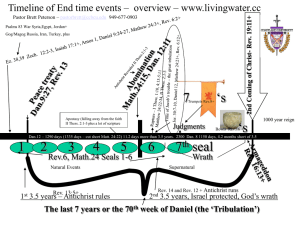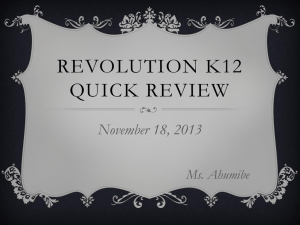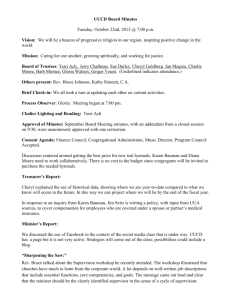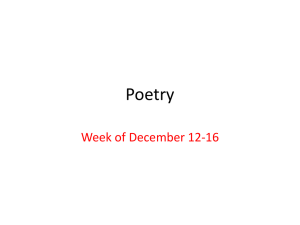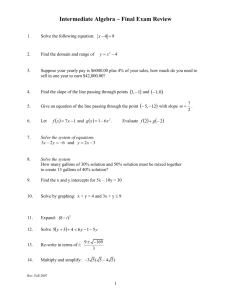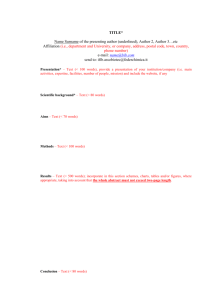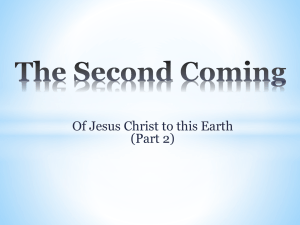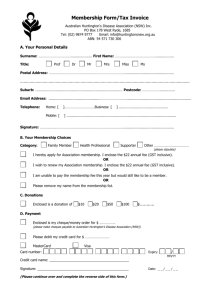2013-09-29 Moving Forward, Rev. Jude Geiger
advertisement
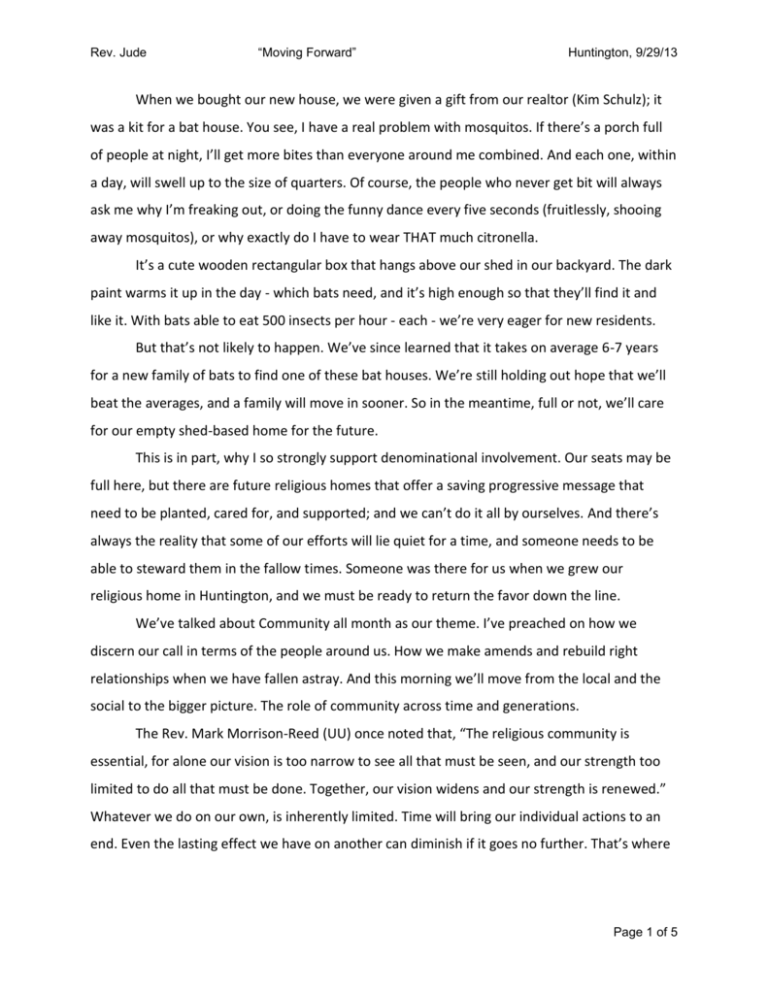
Rev. Jude “Moving Forward” Huntington, 9/29/13 When we bought our new house, we were given a gift from our realtor (Kim Schulz); it was a kit for a bat house. You see, I have a real problem with mosquitos. If there’s a porch full of people at night, I’ll get more bites than everyone around me combined. And each one, within a day, will swell up to the size of quarters. Of course, the people who never get bit will always ask me why I’m freaking out, or doing the funny dance every five seconds (fruitlessly, shooing away mosquitos), or why exactly do I have to wear THAT much citronella. It’s a cute wooden rectangular box that hangs above our shed in our backyard. The dark paint warms it up in the day - which bats need, and it’s high enough so that they’ll find it and like it. With bats able to eat 500 insects per hour - each - we’re very eager for new residents. But that’s not likely to happen. We’ve since learned that it takes on average 6-7 years for a new family of bats to find one of these bat houses. We’re still holding out hope that we’ll beat the averages, and a family will move in sooner. So in the meantime, full or not, we’ll care for our empty shed-based home for the future. This is in part, why I so strongly support denominational involvement. Our seats may be full here, but there are future religious homes that offer a saving progressive message that need to be planted, cared for, and supported; and we can’t do it all by ourselves. And there’s always the reality that some of our efforts will lie quiet for a time, and someone needs to be able to steward them in the fallow times. Someone was there for us when we grew our religious home in Huntington, and we must be ready to return the favor down the line. We’ve talked about Community all month as our theme. I’ve preached on how we discern our call in terms of the people around us. How we make amends and rebuild right relationships when we have fallen astray. And this morning we’ll move from the local and the social to the bigger picture. The role of community across time and generations. The Rev. Mark Morrison-Reed (UU) once noted that, “The religious community is essential, for alone our vision is too narrow to see all that must be seen, and our strength too limited to do all that must be done. Together, our vision widens and our strength is renewed.” Whatever we do on our own, is inherently limited. Time will bring our individual actions to an end. Even the lasting effect we have on another can diminish if it goes no further. That’s where Page 1 of 5 Rev. Jude “Moving Forward” Huntington, 9/29/13 tradition, in its largest sense, carries us further. As a community of communities, our ways, patterns and practices can continue on. But as Morrison-Reed says, it’s not just about us. In fact, the broadest traditions are almost the opposite of us. “...For alone our vision is too narrow...”. And we join religion to enable a wider view and a longer memory. That we might contribute to the tapestry of life through the high points and the low points. So that when we are too weak, we may share our strength with enough people that we become strong. And we are strong again for it. That is what denominationalism can mean. For some of us, we are converts from another tradition. Others may be life-long UU’s who have never dipped their foot in the larger denominational work. Some may still be carrying scars from a tradition where the word “denomination” meant to them “calcified hierarchy.” Others may be at a place where they come here for this community and don’t identify with our wider faith. I suggest now that one of the challenges of membership is to appreciate the purpose and positive impact our tradition holds for all of us. This house of hope wouldn’t be here without it. Some will chide that Unitarian Universalism is anything but an “organized” religion. It’s a joke I’ve never really thought held much water. I’m a product of our organization. My training, my mentors, the financial support I’ve received, the professional groups that I can rely on to help in times of particular challenge. The assistance this congregation received in its back-toback clergy and educator searches. The connections in times of sabbaticals. All the dynamic programming our youth enjoy at the regional level through conferences, retreats, workshops, and the list goes on. The curricula we use, the national justice campaigns we learn and serve, and the list goes on and on. We will often joke we’re not organized because it lets us off the hook. If we’re not organized, then nothing is demanded of us. And too often, we don’t want anything demanded of us.... Whatever our preference though, do remember ... religion does make demands of us. In fact,… it’s good for our spirits that it does. On our own, we can fall into complacency, self-aggrandizement, and even prejudice. On our own, we are not held accountable. One of the most important lessons I learned in seminary is that we are always accountable for our actions, our faith, our behavior. Community calls us Page 2 of 5 Rev. Jude “Moving Forward” Huntington, 9/29/13 back into accountability, even on the days we’d prefer it not. And that’s good for our souls. We are not meant to live as isolated creatures. It is not good for us to always be let off the hook, even if from time to time letting something drop is a healthy thing. The world is not a series of low-bar reality TV shows with no relevance. On our own, we can start to think that way, and we need to be guided - back on path - from time to time. What we can accomplish is also so much more as a tradition. A few years back I attended one of the ministers’ gatherings at our denomination’s General Assembly. In this particular worship service, there were two sermons delivered. One from a minister in their 25th year of ministry, and the second was a minister in their 50th year of ministry. The 50 year minister happened to be the Rev. Clark Olsen. Rev. Olsen was the minister of the Berkeley Fellowship of Unitarians at the time of the Selma civil rights march in 1965, when he survived an attack that fatally injured another white minister, the Rev. James J. Reeb; this happening not a month after the shooting of Jimmie Lee Jackson, a black civil rights activist – the reason for the march. I found his talk incredibly moving and remarkably humble. I always imagined the folks who marched on Selma in this otherworldly light for being the folks that stood up for their convictions, the people who had no other place left to go so they went and stood up for themselves, who stood up for basic humanity in each of us – and certainly they were the ones that were far ahead of the common view of the times – with some giving their lives. I marveled though at how everyday the decision was for this minister. He spoke about how he almost didn’t even go. He wanted to, but the money wasn’t there to make the travel across the country. Then one of his congregants donated the money for Clark Olsen to travel and stand for their congregation. It gave him the opportunity to stand witness, and to be there for the last moments of his colleague and friend’s life. But I don’t even know the name of the congregant that made that possible. I don’t even know their name. Hearing this part of the story, the part that’s not shared in the history books, helped me to see the broader and deeper connections all our actions make in the work of justice in our world. It transformed it from a history lesson about certain heroes and martyrs, to one about the everyday work of building community. It certainly takes both kinds of justice work, but it Page 3 of 5 Rev. Jude “Moving Forward” Huntington, 9/29/13 reminded me that we each have a part to play. It made the impossible seem a little more probable to my mind and my heart. It’s not about a handful of people. Justice is the turning toward committed action with a concerted effort. It’s the spirit of what we often call Right Relations applied to neighborhoods, and to schools, and to court systems. And it takes all of us, in small ways and in large ways, to bring that about. It’s not reserved for a handful of heroes, but reliant upon our very everyday strivings - together. Alone, our everyday strivings sometimes plant seeds - and that’s a great thing. But together we can more productively garden our plantings into something that’s meaningful, sustainable, and makes a more lasting impact. I’d like to end our sermon by returning to the message of our Buddhist parable this morning of the monk who sat in a tree. “This is my question. Tell me monk, what is it that all the wise ones have taught? Can you tell me the most important thing the Buddha ever said? ... finally “This is your answer governor. Don’t do bad things. Always do good things. That’s what all the Buddhas taught.” Right, hopefully we all learn this by the time we’re three years old, and we all spend the rest of our lives learning to forget that. It would be convenient - it would be easy - to say that religion and denomination aren’t really important. All we have to do is remember what we learned when we’re three. Yeah, that’s all we have to do - and the world shows us countless examples of people forgetting the basics. Religion can be the source of the problem or the source of the solution. I challenge us to join this faith as part of the solution. Not joining it solely because we want to find like-minded people who confirm and reinforce our values. Not joining it solely to have another way to make friends when we’re lonely. Not joining it solely because we’re trying to find our way in the world. I challenge us to join this faith - or rejoin this faith - to be held accountable. We are never always going to be right. We are never always going to be able to face the challenges of the world on our own. We will not always remember what is right and good in every situation. Legacy of justice-making requires the baton to be passed from one hand to another across the ages. We can’t hold onto it and still expect to win the race - and we can’t pass it along by ourselves. And remembering what we all learned at the age of 3 is clearly one of the toughest challenges life has to offer. So let’s tackle and re-tackle that lesson Page 4 of 5 Rev. Jude “Moving Forward” Huntington, 9/29/13 together. May we hold one another in our arms - accountable - with hope in our hearts, and love on our lips. Hymn #300 – With Heart and Mind Page 5 of 5

